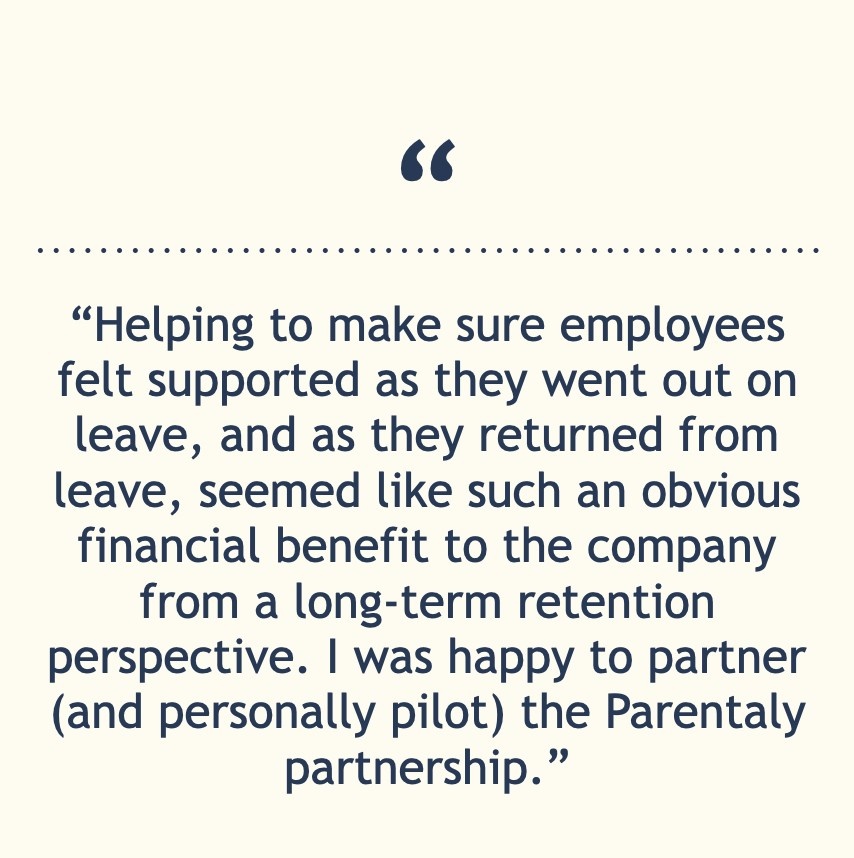Kelly's story:
One HR leader meets employees where they are after facing her own challenges as a bio, adoptive and foster working parent
As an HR professional and mom-of-five, Kelly Scheib is no stranger to parental leave policies and has seen her fair share of challenging situations.
Experiencing working parenthood as a biological, adoptive and foster parent, Kelly had very different experiences because the paid parental leave her employers provided were based on whether she birthed her children or not.
Since there was no paid policy for adoptive parents, Kelly took zero maternity leave when welcoming her daughters, Charlie and Kassidy, into her family.
She recalls Charlie was dropped off in the parking lot of her office by the Department of Social Services at 4-weeks old, and she returned to work the day after picking up Kassidy at 2-days-old because she couldn’t afford the loss of income without paid leave.
Kelly’s experience with parental leave (or lack thereof) has shaped how she leads HR in her role at Crunchbase to best support all employees. For example, their parental leave policy provides 14 weeks of paid leave to all parents…regardless of birthing status.
But this is just a baseline. Kelly does not believe blanket policies work for all parents since scenarios can be vastly different and unpredictable.
For example, A foster child might arrive on a Monday and leave on a Thursday—or they might stay forever. An adoption process could take months or even years, and there are many steps (before and after) parents are committing to, like courts and therapies, based on the child’s needs.
And while Kelly respects that businesses need to run as businesses, she also feels corporate America has a societal responsibility to serve all children. She suggests employers educate themselves on the realities of all paths to parenthood and make space for employees based on their individual needs.
This is how Kelly leads HR at Crunchbase. She subscribes to a concept she coined last year: being “audaciously individualistic.” Simply put, this means looking at individuals and their circumstances, meeting them where they are, and giving them as much choice as possible.
One example of how Crunchbase lives this approach is by giving every employee a wellness fund with the option to choose from a selection of benefits that are most pertinent to their individual needs.
As a working parent who has taken anywhere from 0 to 12-weeks of leave, Kelly’s advice to expecting employees is this:
“Talk early with your employer about how they can support you in your leaves - and take the time that’s at least afforded to you by law. Because you’ll never, ever regret being with your baby…but you will regret not [taking the time].”
Read Kelly’s full Q&A below to hear more from a progressive HR leader who believes benefits should be inclusive of all parents, regardless of birthing status.
Can you give us an overview of your parental leave experiences and how they differed for each child?“I had my first daughter pretty early in my HR career when I was 25. I returned from maternity leave seven weeks after giving birth because The Great Recession had started and I was in HR, so I had to lay people off. It was awful.
My second daughter was born when I was an HR manager for the same organization. I took three weeks off, but came out of maternity leave to negotiate a union contract for a few weeks and then went back into maternity leave. There were all sorts of challenges. I remember being desperate for negotiations to end so I could go pump.
With my son, I was at the same company but in a different role and location. I took 12 weeks off with him, but only six weeks of paid leave. So I started working part-time (remotely) at 6-weeks so I wouldn't lose income.
My other daughters are interesting because I'm not their biological mother, but I am their adoptive mother. Charlie came to me at 4-weeks old and was dropped off in the parking lot of my office by the Department of Social Services. I took zero maternity leave and returned to work the next day. With Kassidy, I picked her up from the hospital at two days old and returned to work the next day.
We also fostered five babies - and with each, I took no leave. So lots of babies, lots of different leave experiences, all the way from 12 weeks to none.”
Was the lack of leave based on those companies' policies not covering foster or adoptive children?“There was no policy that allowed for paid leave. When I was fostering, I could have taken UNPAID leave. But when you're a foster parent, you have no idea what your reality with that child will be - so we knew as a family, we couldn't jeopardize our careers because we had other humans to feed. So we found childcare quickly. I always made sure I secured daycare spots long before accepting the placement. And that's how we made it work.”
What is the best thing you did during a return-to-work period after parental leave? What was the worst thing you did?“Returning to work got easier as I had more children. With my first daughter, I don't know if I did anything well except one thing: I knew when I had crossed a line. And I knew when I had done too much.
I remember smelling the daycare worker’s perfume when holding my daughter [after an almost 12-hour day], and it broke my heart. So I told my husband I was changing my hours at work - and if my company doesn’t allow me that flexibility, I would quit. I was so scared my boss would say I can’t, but it was so easy! He was like, ‘OK!’ and I feared so much for nothing, it was almost like I put so much on myself that I didn't need to.
The world has changed so much in the last 14 years because of organizations like yours. Employers are just so much more open to flexibility. When I think back then, I feared my daughter getting another ear infection because I would miss more work.”
What can companies do to better support foster and adoptive parents?"It’s our societal responsibility to serve foster children, and employers need to educate themselves on the realities of the system. Traumatized children are coming into your home and you can't just turn around and leave the next day. It doesn't work – you're not doing them a service. So if you want to have people in the workforce participating but also serving a community and societal need, you must educate yourself on the process.
This means understanding that a child can show up on a Monday and leave on a Thursday, or that child could show up on a Monday and leave never. But that doesn't mean leave isn't needed. And I think educating yourself on the process of foster care specifically and what that means is important. There are courts, therapies and all the things you didn't necessarily sign up for when you gave birth to a biological child. Now you have a child in a very different circumstance - probably more in need.
It falls on the employer to bear the burden, but I think they should be community-responsible. Yes, you have to show up at work…but there are lots of creative ways for employers to be flexible to take on this society responsibility.
I subscribe to this concept that I coined last year called being audaciously individualistic. Employers must look at individuals and circumstances and apply flexibility to individuals. I do not believe that blanket policy works when it comes to a foster care and adoption situation because everyone's circumstances are different.”
You’re in the position of making these policies. How would an HR leader update language to the company parental leave policy, or is it done on an individual basis when someone comes to share their situation?“I get asked that question a good bit. Do we have a blanket policy? Yes, there is a blanket policy, but do I believe we should meet people where they are? 100%.
You can’t cookie-cutter life - and often employers try because they have been scared into thinking consistency is key, that they have to treat everyone the same. But people are not the same!
As long as employees understand there will be policies and there’s an expectation that they work, there's also an expectation that we're going to care for the individual human as a human. And that is something that just falls flat from an HR perspective and a business perspective, especially larger employers. So often, people just don't think that way because consistency, consistency, consistency has been drilled into our brains.”
What is your advice to employees who want to advocate for better support for working parents? What are your tips for how they can best partner with HR to make that happen?“The best advice I would give is to explain what happens when you don't support working parents. What you do from an equality perspective goes down the drain, and it’s so important to be fair to everyone. And the second you don't support them, you're essentially putting that sole burden on the human that's about to make a human.
Advocacy can look a lot of different ways. You can advocate for flexibility and benefits. You can advocate for different hours, you can advocate for a lot of different things, but I still would stress the individualized approach.”
Crunchbase offers all parents 14 weeks of paid leave, regardless of birthing status. Why is that?“We’re just good employers and it’s very important for us to support leave. I wish we could provide longer leave, but one thing that Crunchbase also offers is flexible PTO. So you can not feel bad when your kid has an ear infection. We are also fully remote, allowing for incredible flexibility so you can work and your baby can be next to you.”
If you could go back in time and give yourself one piece of advice as a new mother, what would that be?“Advocate for yourself. You're never going to regret the time spent with your baby. But you will regret time not spent because of fear of advocacy. Know where your lines are. And when they get crossed, know you have options.
Everyone's journey is different. And as a new mother, there's one set of realities. And as your children age, there's a very different set of realities. You're on a journey with that human, and that's the most important human, so always remember that when juggling it all. It's so much easier said than done, so know it's natural for it to be a struggle.”
Anything else you want to share with employees who are expecting their first child?“You can't turn back the hands of time. When you want to have a child, or you're expecting your first child, try to talk early with your employer about how they can support you in those leaves - and then build a world of support around you.
You're never, ever going to regret being with your baby. But you will regret not. I regret not spending the time with my babies—I’ll never get that back. So work with your employer early, and understand how they will support you. You'll never regret spending time with your babies to at least take the time afforded you by law.”
Want to be the first to know about new stories like this?
Subscribe to our newsletter to receive profiles of inspiring working parents
directly in your inbox each month.


